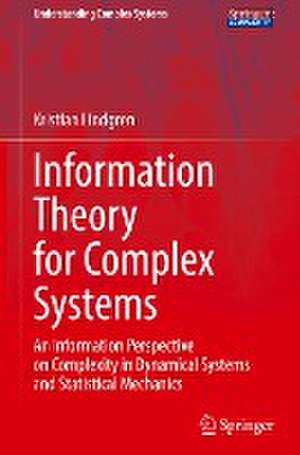Information Theory for Complex Systems: An Information Perspective on Complexity in Dynamical Systems and Statistical Mechanics: Understanding Complex Systems
Autor Kristian Lindgrenen Limba Engleză Hardback – 5 ian 2024
This book introduces a comprehensive framework tailored for dissecting complex systems across diverse disciplines. What defines a complex system? How can we harness information to quantify its order, structure, and intricacy? Delving into phenomena from the intricate processes in physical systems to the dynamic behaviours in cellular automata and pattern formation, readers will uncover the profound interplay between physics and information theory.
This intricate relationship provides fresh insight into physical phenomena, reimagining them through the lens of information. Notably, the book demystifies how seemingly opposing forces—rising order and increasing disorder—coexist, ultimately shedding light on the second law of thermodynamics as an outcome of deterministic, reversible dynamics beneath the surface.
Geared towards graduate students, this book presumes an undergraduate foundation in mathematics and physics, ensuring a deep, engaging exploration for its readers.
Din seria Understanding Complex Systems
- 18%
 Preț: 1112.30 lei
Preț: 1112.30 lei -
 Preț: 439.25 lei
Preț: 439.25 lei - 18%
 Preț: 1119.38 lei
Preț: 1119.38 lei - 15%
 Preț: 401.82 lei
Preț: 401.82 lei - 18%
 Preț: 1247.26 lei
Preț: 1247.26 lei - 15%
 Preț: 641.20 lei
Preț: 641.20 lei - 15%
 Preț: 642.68 lei
Preț: 642.68 lei - 15%
 Preț: 651.51 lei
Preț: 651.51 lei - 18%
 Preț: 946.55 lei
Preț: 946.55 lei - 18%
 Preț: 947.98 lei
Preț: 947.98 lei - 20%
 Preț: 650.27 lei
Preț: 650.27 lei - 18%
 Preț: 952.09 lei
Preț: 952.09 lei - 18%
 Preț: 957.13 lei
Preț: 957.13 lei - 18%
 Preț: 943.88 lei
Preț: 943.88 lei -
 Preț: 398.35 lei
Preț: 398.35 lei - 5%
 Preț: 1417.54 lei
Preț: 1417.54 lei - 15%
 Preț: 648.42 lei
Preț: 648.42 lei -
 Preț: 387.75 lei
Preț: 387.75 lei - 18%
 Preț: 1133.76 lei
Preț: 1133.76 lei - 18%
 Preț: 948.16 lei
Preț: 948.16 lei - 20%
 Preț: 655.85 lei
Preț: 655.85 lei - 18%
 Preț: 1113.09 lei
Preț: 1113.09 lei - 20%
 Preț: 655.53 lei
Preț: 655.53 lei - 15%
 Preț: 653.00 lei
Preț: 653.00 lei - 18%
 Preț: 1332.92 lei
Preț: 1332.92 lei - 18%
 Preț: 1010.48 lei
Preț: 1010.48 lei - 18%
 Preț: 955.56 lei
Preț: 955.56 lei -
 Preț: 384.22 lei
Preț: 384.22 lei - 18%
 Preț: 950.66 lei
Preț: 950.66 lei - 15%
 Preț: 638.43 lei
Preț: 638.43 lei - 15%
 Preț: 644.49 lei
Preț: 644.49 lei - 15%
 Preț: 647.40 lei
Preț: 647.40 lei - 15%
 Preț: 649.06 lei
Preț: 649.06 lei - 15%
 Preț: 639.25 lei
Preț: 639.25 lei - 15%
 Preț: 643.65 lei
Preț: 643.65 lei - 18%
 Preț: 960.78 lei
Preț: 960.78 lei - 15%
 Preț: 649.87 lei
Preț: 649.87 lei - 15%
 Preț: 645.47 lei
Preț: 645.47 lei
Preț: 726.55 lei
Preț vechi: 886.03 lei
-18% Nou
Puncte Express: 1090
Preț estimativ în valută:
139.03€ • 148.67$ • 115.92£
139.03€ • 148.67$ • 115.92£
Carte tipărită la comandă
Livrare economică 17 aprilie-01 mai
Preluare comenzi: 021 569.72.76
Specificații
ISBN-13: 9783662682128
ISBN-10: 3662682125
Ilustrații: XI, 153 p. 70 illus., 16 illus. in color.
Dimensiuni: 155 x 235 mm
Greutate: 0.41 kg
Ediția:1st ed. 2024
Editura: Springer Berlin, Heidelberg
Colecția Springer
Seria Understanding Complex Systems
Locul publicării:Berlin, Heidelberg, Germany
ISBN-10: 3662682125
Ilustrații: XI, 153 p. 70 illus., 16 illus. in color.
Dimensiuni: 155 x 235 mm
Greutate: 0.41 kg
Ediția:1st ed. 2024
Editura: Springer Berlin, Heidelberg
Colecția Springer
Seria Understanding Complex Systems
Locul publicării:Berlin, Heidelberg, Germany
Cuprins
Introduction.- Information theory.- Information theory for lattice systems.- Cellular automata.- Physics and information theory.- Geometric information theory.- Pattern formation in chemical systems.- Chaos and information.- Appendix.- References.
Notă biografică
Kristian Lindgren is a Professor Emeritus in Complex Systems at Chalmers University of Technology. Originating from a background in physics, he has applied this foundational knowledge to the interdisciplinary study of complex systems across a variety of disciplines. His key research areas include information theory and statistical mechanics, as well as the application of information theory to complex and self-organizing systems. Lindgren has also delved into game theory as it applies to evolutionary systems and has utilized agent-based modelling to understand economic systems. He was one of the founders of the International Masters Programme in Complex Adaptive Systems at Chalmers in 2000 and has also served as the Director for the Graduate School (Ph.D.) in Complex Systems.
Textul de pe ultima copertă
This book introduces a comprehensive framework tailored for dissecting complex systems across diverse disciplines. What defines a complex system? How can we harness information to quantify its order, structure, and intricacy? Delving into phenomena from the intricate processes in physical systems to the dynamic behaviours in cellular automata and pattern formation, readers will uncover the profound interplay between physics and information theory.
This intricate relationship provides fresh insight into physical phenomena, reimagining them through the lens of information. Notably, the book demystifies how seemingly opposing forces—rising order and increasing disorder—coexist, ultimately shedding light on the second law of thermodynamics as an outcome of deterministic, reversible dynamics beneath the surface.
Geared towards graduate students, this book presumes an undergraduate foundation in mathematics and physics, ensuring a deep, engaging exploration for its readers.
Caracteristici
Offers a unique blend of information theory, dynamical systems, and physics Provides an in-depth exploration of information theory as applied to complex systems Aids in the understanding of various phenomena, such as the pattern formation in self-organizing systems
